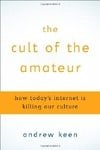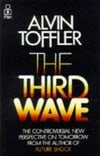A month ago, I went to Felix Meritis in Amsterdam, where Andrew Keen held a debate about his book "The Cult of the Amateur". I heard of him before, and consulted his blog a number of times, which did not draw my attention very much. I thought he made a point through exaggeration, and nothing wrong with it if, at least, there is some data and reasonable argumentation backing his statements. I was quite interested if he would convince me, because I thought it was good to hear something about the negative side of Web 2.0. And negative it was.
It turned out to be pretty disappointing, both the lecture of Keen, which was somewhat engaging, using many examples and being very enthusiastic and cynical, and the reply by the other persons who were invited. Although examples can be engaging and create more understanding about a subject, you can hardly generalize them into always-true statements, since.. well, they are examples. But that was exactly what Keen was doing, examples prove his point of view.. a pretty childish way of argumentation, which he used extensively in his book as well.
Andrew Keen is an angry man. He is angry at anything that resembles Web 2.0, he despises creations of amateurs online, filesharing, remixing of content, and he embraces everything that came before Web 2.0. In his anger, it must have been very hard for him to follow a consistent line of reasoning. The argumentation in the book is so lousy, I think I have never seen such lousy reasoning. And I don't get it. Although he admires and continuously points out the advantages and necessity of cultural gatekeepers, working at traditional media companies, it seems like he had not had any editor at all. This was exactly the point made by Stanford Law professor Lawrence Lessig, in his very funny review about the book.
The basic argument in the book is that Web 2.0, or the ability of anyone able to contribute anything (from news to videos to music) online, diminishes the traditional structures and organizations in the media industry. This will damage our culture and in the end ruin it. Because anyone can put anything online, the quality is becoming less reliable of what you read and see, and more intertwined with commerce etc. There are so many flaws in this piece of rubbish, that it seems a Sisyphean task trying to document them. Maybe.... in a collective effort we could do that, as has been intended by Lawrence Lessig.
Although the book flaws in a substantial way (factual errors & bad argumentation), the basic point made in the book has some significance: quality of information and trust in people and information is decreasing in an ever-expanding online information space. There is a lot of rubbish online, and maybe, it has become less easy for kids and adults to distinguish high quality from low quality. Still, technology also enables people to overcome these problems. PEERS is one of these technologies that enables information to be linked (back) to persons, persons with reputations and the ability to judge and evaluate information and people. This will create a dynamic hierarchy, in which people and information can be better found and trusted.
All in all.. don't bother reading the book.. just pick up the main message, which has some truth in it. As technology creates problems, don't forget it can also solve them. When I get hold of a book that offers a more substantiated critique and better advice in how to deal with the egalitarian characteristics of the Internet, I will post it here as well.
|
Points: 1022
hennisAdd hennis as a friendhennis will be notified and will have to accept this friendship request, to view updates from hennis and their ratings you must follow them. |
Lists
|
PEERS ONLINE INTERACTION FRAMEWORK
(41 items)
Book list by hennis Published 15 years, 11 months ago
 2 comments
2 comments |
Recent reviews
All reviews -
Books (1)
Watch out: Keen-Bubble!
 Posted : 15 years, 10 months ago on 13 June 2008 10:57
(A review of The Cult of the Amateur: How Today's Internet Is Killing Our Culture)
Posted : 15 years, 10 months ago on 13 June 2008 10:57
(A review of The Cult of the Amateur: How Today's Internet Is Killing Our Culture) 0 comments, Reply to this entry
0 comments, Reply to this entry
Books
Top rated |
 My books page My books page Rated 14 books Rated 14 books |
My feed
hennis commented on a list
15 years, 10 months ago
hennis commented on a list
 PEERS ONLINE INTERACTION FRAMEWORK (41 books items)
PEERS ONLINE INTERACTION FRAMEWORK (41 books items)"the following books can be read online as well: * Wealth of Networks: www.benkler.org/Benkler_Wealth_Of_Networks.pdf * Democratizing Innovation: web.mit.edu/evhippel/www/books/DI/DemocInn.pdf * Zen"
15 years, 10 months ago
 Login
Login
 Message
Message
 Home
Home 2 Lists
2 Lists 1 Reviews
1 Reviews Collections
Collections


